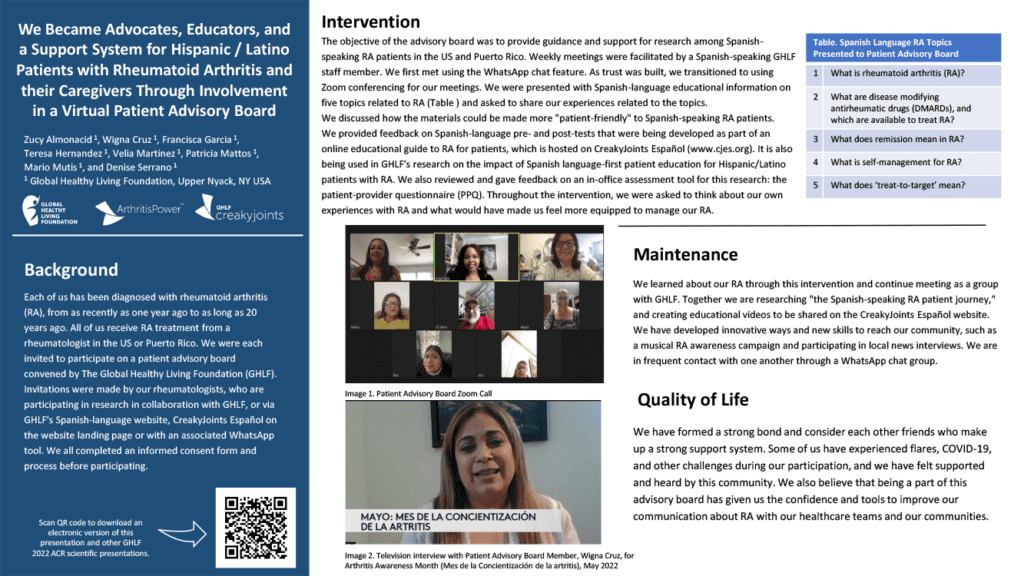Research is changing for the better. Where once research exclusively included the voices of academics and only focused on the experiences of a narrow segment of society, today research is increasingly including the voices of patients belonging to several racial and ethnic communities.
Just ask patient advocate Wigna Cruz, who will be presenting her poster: “We Became Advocates, Educators, and a Support System for Hispanic/Latino Patients with Rheumatoid Arthritis and their Caregivers Through Involvement in a Virtual Patient Advisory Board” at ACR Convergence 2022, the annual meeting of the American College of Rheumatology. Wigna’s research is about her experience taking part in an advisory board for Spanish-speaking patients with rheumatoid arthritis.
Wigna, along with seven of her patient peers on the advisory board, were invited to participate by their rheumatologists in collaboration with the Global Healthy Living Foundation, or enrolled via GHLF’s Spanish-language website CreakyJoints Español, or with an associated WhatsApp.
In her poster, Wigna describes the potential of patient advisory boards to improve care and educational initiatives for Hispanic patients worldwide. Through participating in the advisory board, Wigna and her fellow patient peers provided feedback on various Spanish-speaking materials to make them more “patient-friendly” and relatable to the Spanish-speaking public. As part of her work with the patient advisory board, she helped develop ways of reaching Hispanic patients with RA, such as by creating a musical RA campaign, posting educational videos on CreakyJoints, and partaking in local interviews.
By providing her insights on a patient advisory board, Wigna is not only uplifting others in the Hispanic community on their disease journeys, but she is also noticing benefits in her own life. “It’s healing for us and helpful to others,” says Wigna. “We have formed a strong bond and consider each other friends who make up a strong support system. Some of us have experienced flares, COVID-19, and other challenges during our participation, and we have felt supported and heard by this community.”
Eventually, the patient advisory board evolved into a flourishing support group that helped patients in both good and hard times.
What Wigna Learned – And What You Can Learn Too
Here, we talk with Wigna about her experience submitting a patient poster for ACR and what she hopes others will take way from her learnings (translated from Spanish):
CJ: What do you hope people will learn from your session?
Wigna: “We are a large Hispanic community and have needed to find education in the Spanish language, but it is not always easy to find access to content and resources or know what to trust. The importance of having support from peers helps us feel empowered. Spanish-speaking patients have different experiences so we can be directed to sources and have conversations or ask questions in a safe and familiar environment.”
CJ: Why is it important for patients like you to share their own research at ACR?
Wigna: “I realized that at first, I was motivated to learn about my condition to ensure that my family, friends, and others understood what I was going through. As I kept attending the group meetings, building a bond through shared stories, and learning from credible sources, the group has become a type of therapy where I get support, learn new things, and have people part of my community that have become like family.”
CJ: What are you most looking forward to at ACR22?
Wigna: “I hope this information will show people that the Hispanic community is looking for ways to be seen, heard, and supported. We are representing different parts of the world, but we come together to share our experiences because it is healing for us and helpful to others. This is a great opportunity to share this message with those who may not have Spanish-speaking patients and who are not aware that we also represent patients going through challenges and are in need of services and support in our language.”
CJ: What piece of advice would you give other Spanish-speaking patients on their health journeys?
Wigna: “Learn to speak up and find support. It’s okay for people to be aware of personal and medical challenges. Rely on your doctors, family, and friends, but also find group support of others who are having similar experiences. Be sure to find evidence-based information and have a source where you can share your concerns or happiness. Opening yourself this way will help you to be mentally healthy to deal with challenges, and you will become a better communicator to advocate for yourself at the doctor’s office and within your community as well.”
CJ: What is the best part of being part of a patient support group?
Wigna: “We are making a change in not only our lives, but we are also bringing awareness to the needs of our community through video projects, surveys, interviews, songwriting, etc. We are reaching people who need to see someone who looks like them and has similar challenges and still says; it’s okay. Although there isn’t a cure, you can find help and support to get to remission and, along the way, you will learn about your condition and be able to focus on the positive things in your life as well.”
Be Part of Research with ArthritisPower
Join CreakyJoints’ patient-centered research registry and participate in voluntary studies about managing arthritis. Learn more and sign up here.
Almonacid Z, et al. “We Became Advocates, Educators, and a Support System for Hispanic/Latino Patients with Rheumatoid Arthritis and Their Caregivers Through Involvement in a Virtual Patient Advisory Board.” Arthritis & Rheumatology. November 2022. https://acrabstracts.org/abstract/we-became-advocates-educators-and-a-support-system-for-hispanic-latino-patients-with-rheumatoid-arthritis-and-their-caregivers-through-involvement-in-a-virtual-patient-advisory-board.






